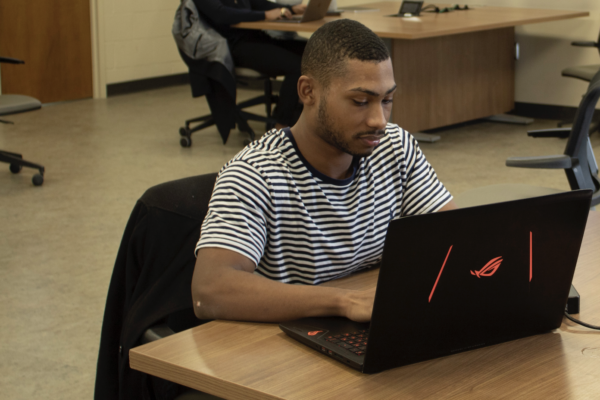Welcome to the Department of Writing, Rhetoric, and Cultures
The department of Writing, Rhetoric, and Cultures is the heart of and home for writing at Michigan State University. Across our initiatives, in the research and scholarship we pursue, and in the teaching and learning opportunities we offer, we emphasize curiosity, discovery, and the robust exchange of ideas along with attention to the importance of writing and communication—drawing across techniques and media, being attentive to audience and purpose, and sharing one’s ideas with the world.
If you have any questions about enrolling in a Fall 2025 First-Year Writing course (WRA 101 or WRA 195H), please see our frequently asked questions page.
The Department of Writing, Rhetoric, and American Cultures (WRAC) offers:
- the first-year writing experience for most MSU students, which prepares students to leverage their experiences as writers and learners as assets for informing their ongoing development as writers
- an undergraduate major in Professional and Public Writing, which provides students experience in the writing and communication strategies crucial for academic, professional, and personal success in today’s digital world
- an interdisciplinary undergraduate major in Experience Architecture, which provides students experience in developing strategies for UX research, design, development of digital applications, project management, coding, writing, and digital rhetoric for success in digital and professional spaces
- a graduate program in Rhetoric and Writing, offering MA programs and a PhD, helping graduate students develop the intellectual, pedagogical, and professional skills to be activists and leaders in academic and beyond-academic careers
we offer

First-year writing experience
Our First-Year Writing courses are the core composition experience for most MSU students, which prepares students to leverage their experiences as writers and learners as assets for their ongoing development as writers.

Undergrad major in professional and public writing
The BA in Professional and Public Writing (P2W) provides students experience in the writing and communication strategies crucial for academic, professional, and personal success in today’s digital world.

Minor in Writing
The Minor in Writing gives students collaborative experiences and writing tools to become great leaders, advocates, and communicators at work and in public spaces. The minor helps students reach their professional goals in any number of careers or graduate programs.

undergrad major in Experience Architecture
The BA in Experience Architecture (XA) provides students experience in developing strategies for UX research, design, development of digital applications, project management, coding, and writing for success in digital and professional spaces.

graduate program in Rhetoric and Writing
Our MA programs and our PhD program support graduate students develop the intellectual, pedagogical, and professional skills to be activists and leaders in academic and beyond-academic careers.

2019 Professional Writing Student of the Year
Emily Jenkins
2018 Professional and Public Writing

2018 Experience Architecture Student of the Year
Ashton Keys
2019 Experience Architecture

“This program has given me so much—the skills and tools to feel like I can enter the workplace at an advantage and people who I can count on along the way.”
SOPHIE SCHMIDT
Professional and Public Writing Alum
The Student Experience: Professional AND Public Writing Major
A quick look at the Bachelor of Arts in Professional and Pubic Writing (P2W) degree at Michigan State University, featuring P2W students, faculty, and alumni.


Spartan Strong: The Strength to Overcome Cancer
Justin Alexander (Experience Architecture ’20) was the picture of health. A baseball player and quarterback of his high school football team, there was no reason to be overly concerned when he developed a persistent cough. So it came as a shock when he first heard he had Hodgkin’s lymphoma, life as he knew it was placed on hold.
featured stories

Board of Trustees Approve Thomas Stubblefield as New Dean of MSU’s College of Arts & Letters
The Michigan State University Board of Trustees voted to approve the recommendation naming Thomas Stubblefield as the next Dean of the College of Arts & Letters at Michigan State University. On July 1, 2025, Stubblefield will join the university to serve as the 12th Dean of the College of Art & Letters. The Board of Trustees voted on the recommendation at its June 13, 2025, meeting. Dr. Stubblefield comes to Michigan State University from the University of Rhode Island where he has served as Associate Dean of the College of Arts and Sciences, Interim Director of the Harrington School

Kathleen Fitzpatrick Named New Associate Dean for Research and Graduate Studies
Kathleen Fitzpatrick has been appointed Associate Dean for Research and Graduate Studies for Michigan State University’s College of Arts & Letters, effective July 1, 2025, following a year serving in the interim role. A nationally recognized scholar of digital humanities, Fitzpatrick is uniquely positioned to guide the college’s research and graduate programs, having spent her career creating open-source tools for academic collaboration while building resilient, sustainable scholarly communities. “Dr. Fitzpatrick brings a wealth of experience to this position and a clear vision for advancing research, creative activity, and graduate education across the College of Arts & Letters,” said Yen-Hwei

Thomas Stubblefield Recommended as Dean of MSU’s College of Arts & Letters
Thomas Stubblefield has been recommended to serve as the next Dean of the College of Arts & Letters at Michigan State University, effective July 1, 2025. Pending approval by the MSU Board of Trustees, he will succeed Yen-Hwei Lin, who assumed the role of Interim Dean in June 2024 following the departure of former Dean Christopher P. Long.
EVENTS
Lorem ipsum dolor sit amet, consectetur adipiscing elit. Ut elit tellus, luctus nec ullamcorper mattis, pulvinar dapibus leo.